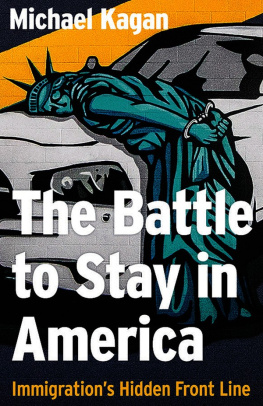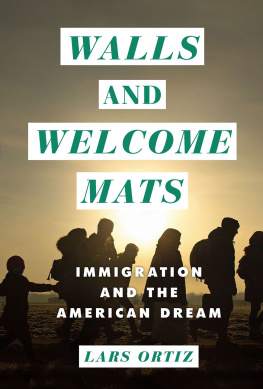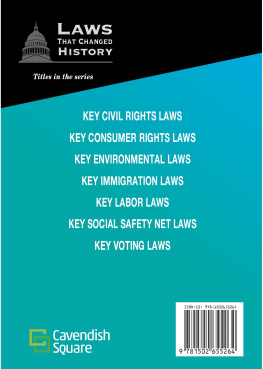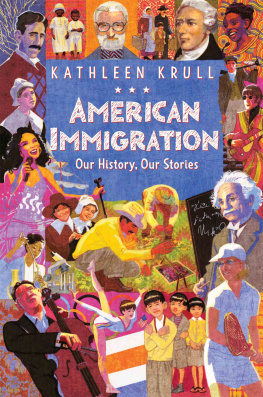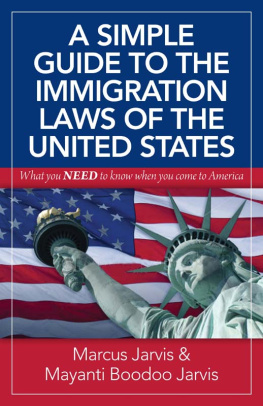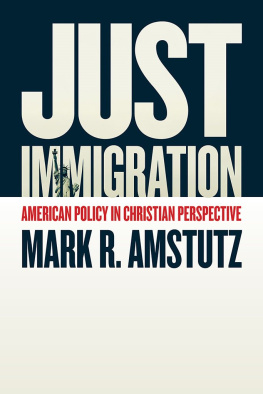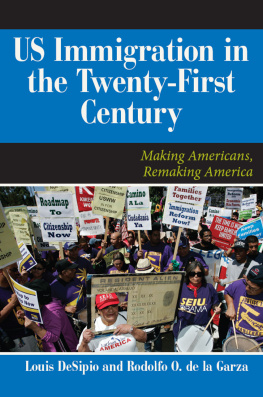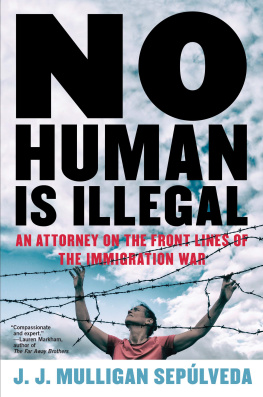University of Nevada Press, Reno, Nevada 89557 USA
Copyright 2020 by Michael Kagan
All rights reserved
Manufactured in the United States of America
Library of Congress Cataloging-in-Publication Data
Names: Kagan, Michael, J.D., author.
Title: The battle to stay in America : immigrations hidden front line / Michael Kagan.
Description: Reno; Las Vegas : University of Nevada Press, 2020. | Includes bibliographical references and index. | Summary: The Battle to Stay in America is the story of a community learning to defend itself from the U.S. federal governments crackdown on immigrants. Told through the eyes of a lawyer on the front line, the book offers an introduction to a broken legal system Provided by publisher.
Identifiers: LCCN 2020016910 (print) | LCCN 2020016911 (ebook) | ISBN 9781948908504 (hardcover) | ISBN 9781948908511 (ebook)
Subjects: LCSH: Emigration and immigration lawUnited States. | Immigration enforcementUnited States. | ImmigrantsNevadaLas VegasSocial conditions. | ImmigrantsNevadaLas VegasAnecdotes. | Immigration lawyersNevadaLas VegasBiography. | United StatesEmigration and immigrationGovernment policy. | United StatesEmigration and immigrationSocial aspects. | Las Vegas (Nev.)Emigration and immigration.
Classification: LCC KF4819 .K255 2020 (print) | LCC KF4819 (ebook) | DDC 342.7308/2dc23
LC record available at https://lccn.loc.gov/2020016910
LC ebook record available at https://lccn.loc.gov/2020016911
29 28 27 26 25 24 23 22 21 20 5 4 3 2 1
In honor of my great-grandparents, my children, and all those who make the journey
Preface
A Note About Word Choice
WE ARE SO DIVIDED ON immigration that I cannot even say who or what this book is about without invoking some controversial vocabulary. The best I can do is to offer a quick guide to some of the more contentious words I use, and why I use them. (Immigration policy also involves an array of legal and bureaucratic terminology, and many different government officials. If you get confused, for example, by the difference between CBP, DHS, and ICE, there is a glossary at the end of the book to help.)
Immigrant: I use the term immigrant to mean a person who was not originally a U.S. citizen who came to the United States to stay and establish a home here. However, in the Immigration and Nationality Act, an immigrant has a narrow meaning: a person who receives legal permanent residency. In the law, a non-immigrant is a non-citizen who is in the country ostensibly temporarily. That could be a business visitor in Las Vegas for a week for the Consumer Electronics Show, a tourist visiting Yellowstone National Park for a few days, or someone on a student visa here for five years. In this book, Ill try to be clear when I am using the strictly legal concept, but most of the time I am using the broader, non-legal meaning.
Alien: The unfortunate and archaic word used in the Immigration and Nationality Act for any person who is not a United States citizen or national. I use alien when quoting the law or another person. I never use it otherwise. Some people take pleasure in using the term aliens to describe immigrants because it is dehumanizing, but it is also in the statute books, which confers some legitimacy. I think we can see what theyre doing. Most of us dont use archaic
Illegal: I use this word, but carefully. Merriam-Websters first definition for this word refers to something that is not according to or authorized by law. Im fine with using the word illegal that way. I have gotten tickets for parking my car illegally, for example. Weve all probably done at least a small illegal act in our lives. Theres no shame in admitting that. That is why I am comfortable talking about illegal immigration, if the term is used in the same way someone might talk about illegal parking on Fremont Street. People do cross borders illegally, and people do overstay visas in violation of the law. However, Merriam-Websters second definition is a problem: a person who enters or lives in a country without the documentation required for legal entry or residence. As in an illegal, or illegals. The dictionary correctly notes that this definition is sometimes disparaging + offensive. Very. Homicide is illegal. But we do not even call a murderer an illegal.
An act can be illegal, but a person can never be illegal. This is why I will sometimes say that a person crossed the border illegally, but I avoid labeling a person an illegal immigrant. I also avoid this term because many undocumented immigrants have been living in the United States for many years. For many undocumented people, the border crossing (legal or illegal) may have been more than a decade ago, which makes it problematic to make that act the defining characteristic of their identity.
I have even more serious problems with the term illegal alien. This phrase combines two dehumanizing words to make a doubly dehumanizing phrase. Thats the point. Using this termjust like saying the illegalssays, in effect, I dont like these people. I dont see them as equal to me. They are different (alien). They are wrong (illegal). Thats not how I talk about other human beings.
Undocumented immigrant: The term most generally favored by immigrant advocates, and the phrase I use, to describe immigrants who are unlawfully present in the United States. As typically used, and as I use it in this book, it includes both people who crossed the border illegally and those who entered legally but overstayed their visas. Although I use undocumented immigrant for lack of a better and commonly understood alternative, I do not love this phrase. Most undocumented immigrants have plenty of documentation proving who they are. The problem is their lack of legal authorization to be where they are.
Introduction
MY DAUGHTER WOULD prefer I not tell this story, but I think it is important. On election night in 2016, she was terrified. She was in fifth grade at the time. Already at that age, the early signs of tweeny drama were upon us. The sound of slamming doors had become common in our house, as had marginally inappropriate music played at extremely high volumes. She did not like to concede that she had to answer to us, or needed anything from us other than transportation and money. Except when it became clear that Donald Trump had won. Suddenly, on the sofa in our home in central Las Vegas, in front of the TV, she sobbed. Not dramatic tears. Id become accustomed to those. She was really crying. It seemed like her body had become smaller; her knees were bent and her elbows were holding them close to her chest. This was my daughter genuinely, deeply upset.
Daddy, Maya said, theyre going to deport me now, right?
I was shocked. To be clear, we are a very politically aware family, progressive in our commitments, and we found Donald Trumps candidacy at once shocking and outrageous from the start. But my wife and I are well-educated, white, upper-middle-class. We were angry and confused by the election, just like many other Americans. But I could not conceive of a way in which Trump would directly hurt us.
On the other hand, both our children were born in Ethiopia. They were adopted. It had never really occurred to me that my older daughter would feel at risk. There are no legal problems with their adoptions. I know, legally, that there should be no danger. So I tried to reassure her. I told her she was a United States citizen. I am a professor of law, and I teach immigration law. I am supposed to know about these things. I asked her to trust me. I told Maya, with as much authority and confidence as I could, You cannot be deported. They cannot do that. But she would not be consoled.

